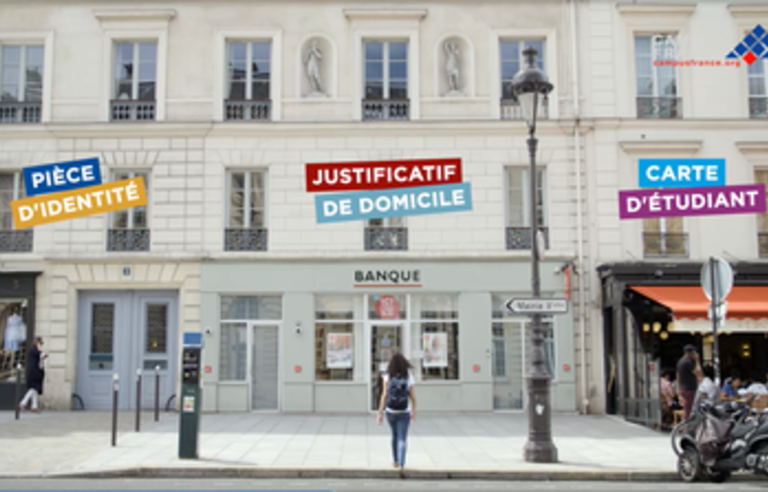After arriving in France, make sure you take care of the following.
Registering at your host French Institution
All the students enrolling in Public universities are required to register in person at the beginning of each academic year. Before enrolling, you are required to make a payment of 90 Euros at the government student service office called CROUS (www.meservices.etudiants.gouv.fr). You need to print the payment attestation and keep it with you.
The registration process is in two steps:
1. Administrative registration (“inscription administrative” in French):
-
Take the printed CROUS attestation with yourself.
-
Pay fees if applicable.
-
Subscribe to a national student health plan.
Once this is done, you will receive your student ID card.
*For related information, visit your host institution’s website prior to departure.
2. Academic registration (“inscription pédagogique” in French):
In this second phase of the process:
-
Choose/Register for courses.
-
Get information on class/exam schedules.
-
Familiarise yourself with assessment methods.
Other French Higher Education Institutions
Private French institutions have their own registration procedures, which are normally communicated to students well before the beginning of the academic year. Make a note of any documents that you may be asked to provide at the time of registration. You may be required to present original documents.
Validating VLS-TS Visa
After your arrival on French territory, you have 3 months to validate your visa. Do not wait until the last moment. More information on the OFII (Office Français de l’Immigration et de l’Intégration) website: www.ofii.fr
The following documents must be sent to the OFII via registered post with acknowledgement due:
1. The OFII form issued by the consulate along with the visa.
2. Copy of passport pages showing the visa holder’s identity and the stamp indicating the date of entry into France (or into the Schengen area).
3. Admission letter/convention de stage (for internship) indicating the purpose of your stay in France.
4. Proof of accommodation in France (rent receipt/gas or electricity bill for the last two months issued in your name or certificate from owner).
5. Proof of Financial resource
6. Two photographs in keeping with specifications.
*The OFII procedure involves a payment of €58, which must be made by purchasing a tax stamp marked OMI or ANAEM. The stamp can be purchased online at www.timbresofii.fr, at certain shops that sell tobacco products (tabac) or at tax offices.
Students will receive a letter from the Prefecture called Récépissé de carte de séjour, a few days after the submission of the application. This certificate must be retained carefully, as it will be required for the renewal of the Carte de Séjour for subsequent years. Once the application has been processed, the OFII will intimate the student by post or by phone to collect the Carte de Séjour (residence permit) in person. The processing time may vary (up to three months, in most cases).
Traveling while awaiting OFII clearance
Within the first three months of arrival in France, foreign travel is authorised without the OFII sticker or proof of paperwork submission (attestation de dépôt de dossier), provided that the student has a valid multiple-entry long-stay visa. However, beyond three months, the OFII sticker is mandatory or, in its absence, proof that the application has been submitted to the OFII (attestation de dépôt de dossier). If not, students will be required to apply for a fresh long-stay visa for which they will have to return to their home country.
Opening a Bank Account
International students may open a Non-resident bank account (in Euros or another currency) or a Resident account (in Euros or another currency), if they stay for more than 3 months.
If you stay in France for more than 3 months, you can open an account in a bank. The following documents will be required to open an account:
- passport;
- visa de long séjour ('long-stay visa') serving as a titre de séjour ('residence permit') (VLS/TS);
- proof of address (gas, electricity or landline bill or even a rent receipt).
The bank will also ask you for a copy of your signature to enable them to confirm the authenticity of any cheques to be processed.
Check if your bank at home has ties with a French banking network, as this may make it easier for you to open an account (perhaps even before you arrive in France) and transfer funds.
Your bank will provide you with copies of your account information (relevés d’identité bancaire, RIBs) which are useful when it comes to having your salary transferred to your account or switching any standing direct debits you may have authorised (rent, phone bill, etc.). You can then start using your current account and request a bank card and a chequebook.
The major bank cards (Visa and Mastercard) are accepted by most French businesses for transactions in excess of €15. Cash transactions must be made in Euros.
Cheque payments are becoming less frequent in France. A few businesses may accept cheques drawn on foreign banks.
Exchange Rates
Exchange rates determine the amount of money you actually have.
A helpful website for exchange rates is The Universal Currency Converter at www.xe.net/currency or www.rbi.org.in/home.aspx. It will take a little time to get used to exchange rates. Just stay aware of them while you are abroad, and pay special attention if you plan to travel outside France.
For more information, visit our sponsor’s website: www.thomascook.in/Best-Live-Rates
Wire Transfer
If you are travelling on weekends, banks and foreign exchange agencies may be closed. Some private operators work on all days but charge high commission and may be difficult and time-consuming to find. You can always exchange money at the airport from which you are departing. Airport exchange rates are normally on the higher side, but if you are exchanging a small amount of money, the difference is minimal.
Cash
You should carry approximately 1000 Euros with you when you leave. This will save you time and trouble when you arrive. This money will be useful for your initial expenses.
ATMs
ATMs offer a number of advantages. They are often open 24 hours and the fees are minimal. The exchange rate is immediate and often. However, if you plan to count on this as a means of organizing your funds, ensure that your card is accepted in France.
Using your Visa or Mastercard debit card is very handy since it will be accepted internationally as both a credit card and an ATM card just like at home. Make sure that you know your PIN numbers before you leave. In addition to debit cards, there are ATMs worldwide that accept Visa, Mastercard, and American Express and allow you to make a cash advance with a PIN number.
Debit cards attached to a savings account will NOT work in ATMs abroad. Talk to your bank about the options open to you while overseas. Some banks even offer a listing of all ATMs in the area where you will be studying. In the case of credit cards, inform your bank that you will be using the card abroad. If you haven’t advised them of your intended use of the card overseas, they may block it. Be sure to have the customer service phone numbers that you will need to contact if your card is blocked. (It is advisable to obtain the contact details of an individual from the bank in your home country.) It is highly recommended that you carry money in different forms, i.e. cash, card, traveller’s cheques, etc.














